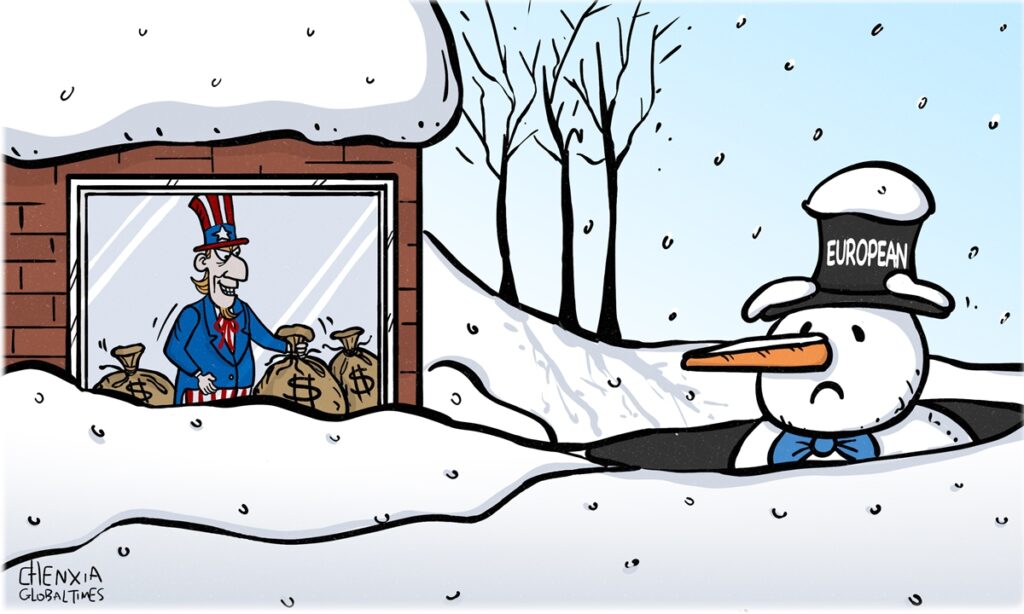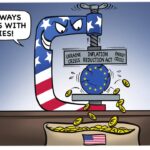US President Joe Biden on Monday called on US oil and gas companies to use their record profits to reduce costs for Americans and increase production, or pay a higher tax rate, Reuters reported on Tuesday. “It’s time for these companies to stop war profiteering,” Biden reportedly said.
By accusing US oil giants of “war profiteering” and threatening a windfall tax, Biden is clearly positioning himself as trying to tackle high oil prices faced by US voters ahead of the midterm elections. However, without any concrete details, this is most likely nothing more than empty political talk.
US oil and gas companies have made windfall profits thanks to the extraordinary geopolitical and energy tensions instigated by the US government. For example, in the third quarter, Exxon Mobil Corp posted record-breaking profits of $19.66 billion, while Chevron Corp reported its second-highest ever quarterly profit of $11.2 billion, according to media reports. Undoubtedly, the US is the biggest winner in the turbulent global energy market, particularly Europe’s energy crisis, due to the Russia-Ukraine conflict.
Biden and his administration have repeatedly complained about high oil prices and huge revenues made by US oil and gas companies, but it has failed to tackle the problem in any meaningful way other than paying lip services just for political optics amid the midterm elections. This just shows once again how inept the US government is in standing up to greedy interest groups and tackling issues directly related to the livelihood of its citizens.
This has become a cliché in the US, but it also has profound implications for the world, specifically for US allies in Europe. As they watch the US government continue to lobby them against using Russian energy, US energy companies keep charging them top dollars for oil and gas and the US government cannot even lower energy costs for its own citizens, Europeans must ask themselves whether the White House cares about their legitimate concerns at all and whether they should continue to trust the US. To put it bluntly, in so many ways, the transatlantic partnership between the US and Europe is increasingly turning into an intense competition.
Many European countries, hit by the energy crisis, are increasingly frustrated by the US’ profiting from their misfortunes. French President Emmanuel Macron recently complained that US gas is too expensive, saying “one thing that can’t go on for too long is us paying four times more than the price you sell to your industry.” Some European countries also tried to join hands with Asian economies to demand the US to sell gas at lower prices. According to some media reports, US companies can earn more than $100 million per container ship of LNG bound for Europe.
The exacerbating energy crisis in Europe and the failure to tackle it mostly point to the divergence between Europe and the US, which clearly puts its own self-interests above that of its allies. They may be able to impose unified sanctions against others, but clearly they cannot unite when it comes to facing the consequences.
And this goes beyond the energy crisis. In fact, due to the competitive nature of the economic structures and development goals of the US and Europe, some conflicts that are hard to bridge in their economies are becoming more and more prominent, and their competition looks increasingly like a zero-sum game.
For instance, the US Inflation Reduction Act explicitly discriminates against the EU’s automotive and renewable energy industries by excluding European companies in the US from benefiting from relevant subsidies. Moreover, the US is taking advantage of the energy crisis in Europe to introduce new incentives to lure European companies to invest and build plants in the US.
Even as Europe’s major economies are bearing the brunt of the Russia-Ukraine conflict, they are also being undercut by the selfish and unfair economic and trade policies put in place by the US. Such an expensive friendship with the US has created a rift that damages transatlantic cooperation. Indeed, there is growing realization in Europe about the divergence between the US and Europe and the complicated implications behind it.
Against this backdrop, China-EU economic and trade cooperation is of great significance for major European economies like Germany and France. A deepening China-EU cooperation can, to a large extent, increase the strength and competitiveness of European economies when it comes to rejecting the US’ attempt to preserve its hegemony at the expenses of others, including allies. Europe should draw a lesson from all this that it should not blindly follow the US in imposing sanctions on others.
(Global Times)




